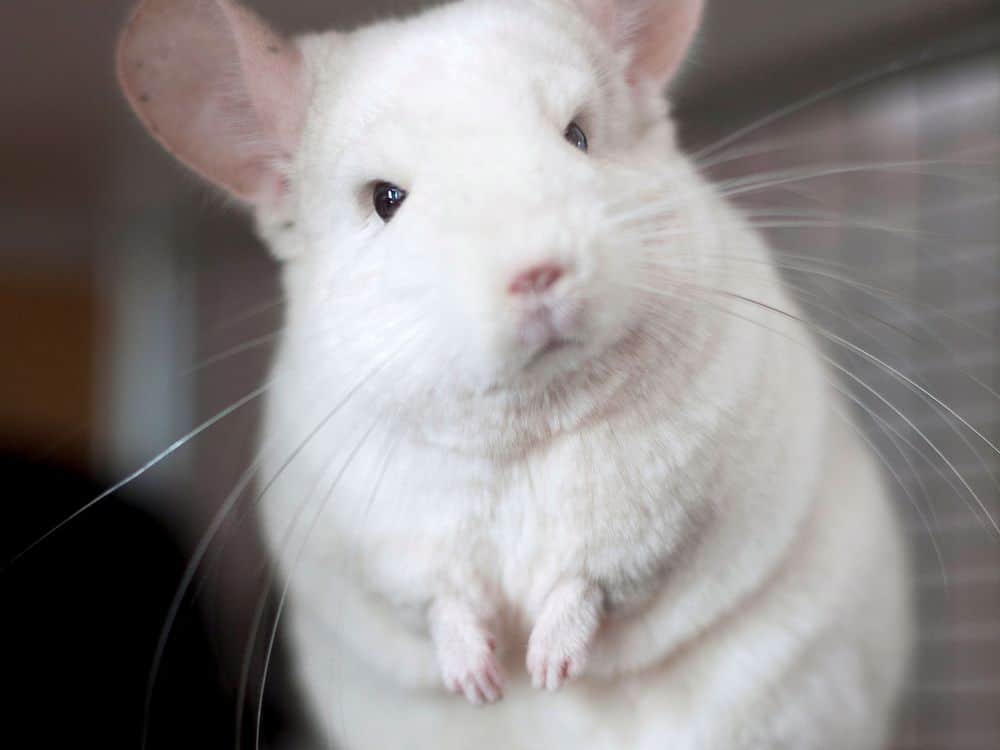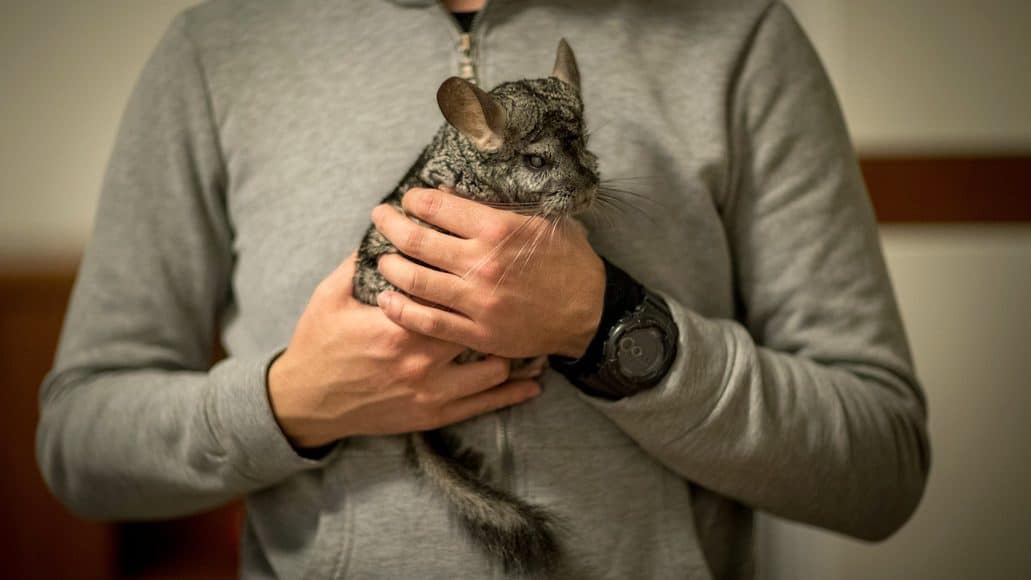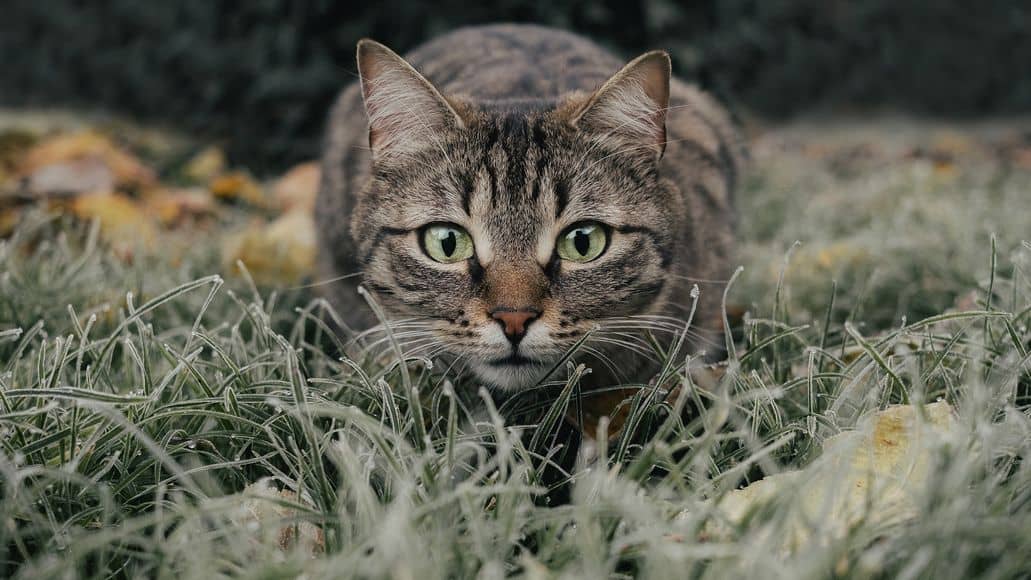
And you lived in a world full of much larger and stronger creatures who all wanted to either eat you or turn you into a fur coat?
You’d probably be scared of just about everything.
So it only makes sense that chinchillas might get scared easily.
But is that actually always the case, or just in the wild? Are they scared easily even in a loving home?
The answer is that it depends primarily on you.
Keep reading to lean exactly what I mean. Because it turns out, you can have a major say in how scared your chinchilla gets.
Do Chinchillas Get Scared Easily?
Yes, chinchillas can get scared easily. These tiny rodents are preyed upon in the wild. It is their natural instinct to flee from even the smallest hint of danger.
Chinchillas scare especially easily in the first weeks in a new environment. But they soon adapt and scare less easily over time.
In the beginning, it will take some warming up before your chinchilla stops fearing you. But once it has gotten used to you, you can look forward to fun interactions, holding your chinchilla and much more.
Chinchillas being scared in the first few weeks of being home is just natural chinchilla behavior.

One of the most important posts I have on this topic discusses how quickly chinchillas adapt. I recommend reading it. It’s entirely about how chinchillas adapt to their environment and you can read it here.
As far as the rest of the details on today’s topic, let’s dive right in.
How To Mitigate Fear In Your Chinchilla
As stated previously, chinchillas do get scared easily. It’s not necessarily your fault either. You must understand that chinchillas are used to being victims in the wild.
They are the hunted.
When you first arrive home with your chinchilla, fear will be at its maximum. Your new pet is attempting to adapt to new smells, visuals and even the lighting. Not to mention your voice and how you choose to handle your chinchilla.
The best thing you can do is embrace this period when you are a new chinchilla owner. If you respect your chinchilla’s space, the breaking-in period doesn’t take long to overcome. For my chinchilla, this warming-up period took about 10 days.
After this time had passed, my chinchilla started showing signs that she was ready to bond. You can read my post discussing if chinchillas are affectionate for more insight. It will provide more of the details about how loving chinchillas can be when they trust you.
It’s after this warming-up period, you can also expect your chinchilla to be more cuddle-friendly. This is another topic that deserves its own post. You can learn if chinchillas are cuddly here.
10 to 14 days into owning my chinchilla she was climbing all over me and sitting in my lap. This did, however, take patience and some additional work on my end to reach this point.
The next section of this post will help you do the same. I will detail some specific tips and tricks you can implement.
Interact As Often As Possible To Build Trust And Reduce Fear

This seems like common sense, right? Well, shockingly enough, many chinchilla owners fail to interact often with their chinchillas.
This is ultimately what builds the bond with your chinchilla. If you want a chinchilla that’s friendly and that wants you around, you don’t have a choice.
Speaking of that, feel free to read my post about if chinchillas are friendly here. It gives good details about a chinchilla’s behavior and temperament after adoption.
Let’s get back on topic.
The more you interact with your chinchilla, the faster it will warm up to you. Clearly, if your chinchilla is warmed up to you, it won’t scare so easily in the future.
Spend some time talking to your chinchilla. Find the spots it loves to be scratched, like perhaps under the chin or behind the ears.
If it doesn’t like something you are doing, simply stop doing it. It’s not necessarily rocket science, but it is a bunch of trial and error to learn your chinchilla’s likes and preferences.
Respect Your Chinchilla’s Space
This is one of the best tips I can give you. It’s the same advice the breeder I adopted my chinchilla from gave me.
Don’t invade your chinchilla’s space.
If your chinchilla is clearly scared, allow it the space to calm down. This can include not doing things like reaching into its hiding box inside the cage.
This is your pet’s safe haven, where it feels the most secure. Let it have that safe space. If you reach for it i there, yo shatter that illusion and fear multiplies.
Also, if you don’t know how best to pick up a chinchilla, don’t corner your chin trying to pick it up. I’ve seen other chinchilla owners using tactics like trying to get their chinchilla into a small travel cage.
Letting your chinchilla come to you is a much better approach and builds much more trust. That way, you’re letting your chinchilla get over its fear on its own terms and its own schedule.
You can always use treats or a dust bath if necessary, to get your chinchilla to come out of a frightened state.
And of course, always remain patient. It’s the most important advice you can be given when adopting a chinchilla.
Patience, patience, patience.
Keep Other Pets And Young Kids In Check The First Few Weeks

This tip can also go a long way towards building the bond with your chinchilla. It can make it much less scared and timid.
I have a 90-pound lab and 2-year-old son so trust me, I know this tip to be true. In the first weeks, if you want your chinchilla to be less scared, keep things basic.
Your dog and chinchilla do not to be interacting together. Your dog doesn’t even need to be in the same room as the chinchilla cage during this phase.
You could also avoid having any young kids around the chinchilla while it is still adapting to its new environment. Young kids tend to make loud, quick noises that may scare your little rodent.
After the ten-day break-in period, this is a completely different story. After that period, interact with your chinchilla as you please.
Just always remember, the first ten days are the hardest for your chinchilla. Relax and take things slow with your chin and everything will be much easier soon.
A Final Tip To Build A Stronger Bond
Outside of the tips already discussed, I have a few other key points to touch on briefly. First and foremost, time out of the cage is essential to eliminating any fears your chinchilla has.
The more you have your chinchilla out and about and interacting with you, the better. If your chinchilla gets scared easily in the beginning, this will fix the problem quickly.
You can take my word on this. I promise it will work, because it worked like a charm for me.
Chinchillas Get Scared Easily: Final Thoughts
Chinchillas do get scared easily. But this typically only happens in the first weeks.
Additionally, avoiding common issues such as cornering your chinchilla or invading its space helps a ton. Simply respect your chinchilla’s space and its preferences and it will respect you in return.
Additionally, always make time to get your chinchilla out of the cage and interact with it. The more interaction you have with your chinchilla, the faster it will recognize you.
This can go a long way to ensuring that your chinchilla is no longer fearful or timid. Of course, your pet can still become startled by sudden noises or other interruptions. Fear is one reason chinchillas scream, so if you suddenly hear that, see if something has scared your pet.
Let’s hear your thoughts!
I’d love to hear your thoughts on this topic as well.
Was your chinchilla timid in the beginning?
What did you do to help your chinchilla become less scared after arriving home?
Be sure to share your stories and drop a comment below.
As always, I appreciate you stopping by. Catch you next time!
Leave a Reply